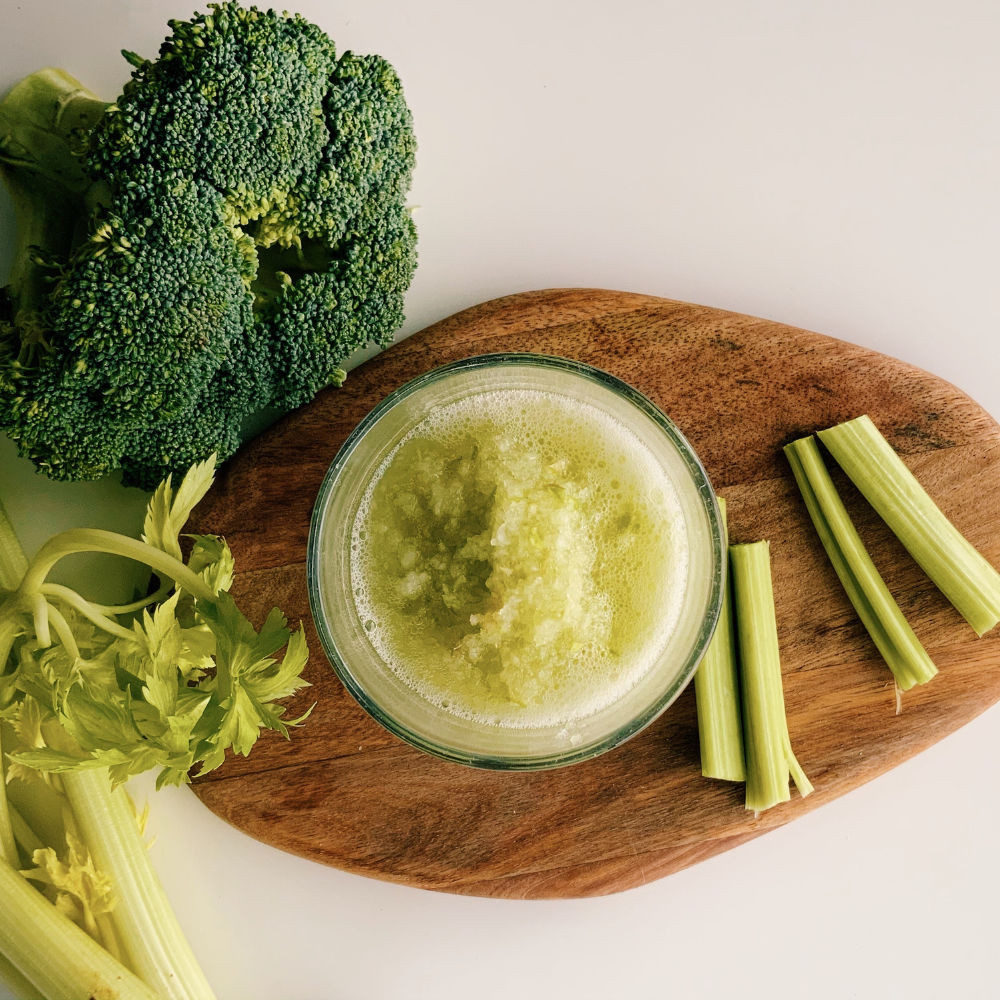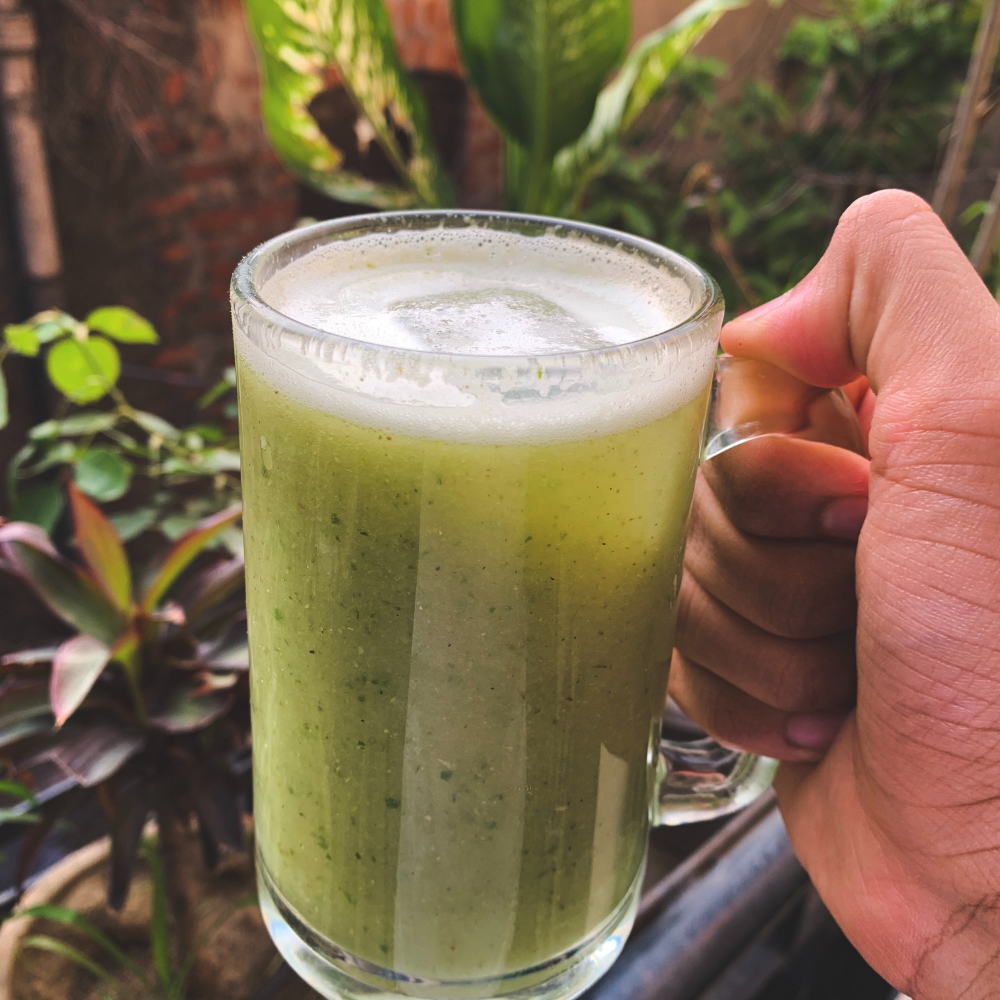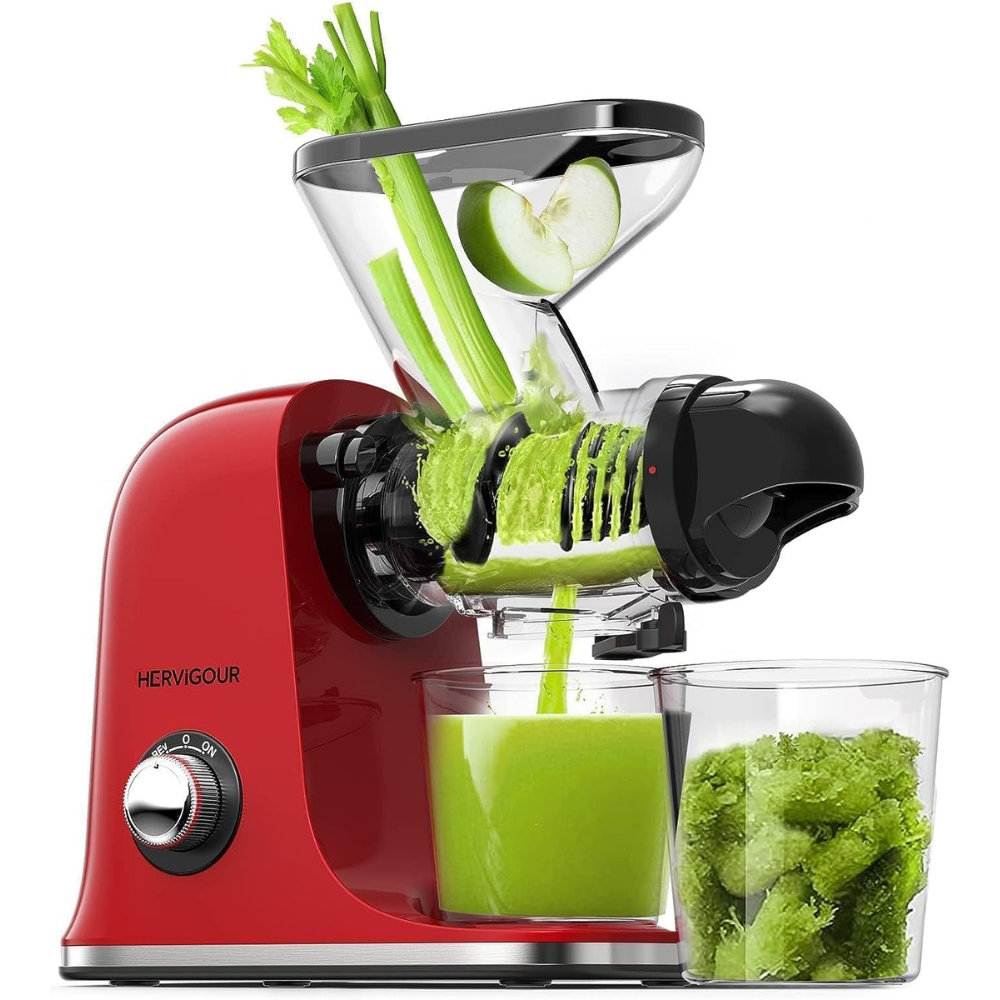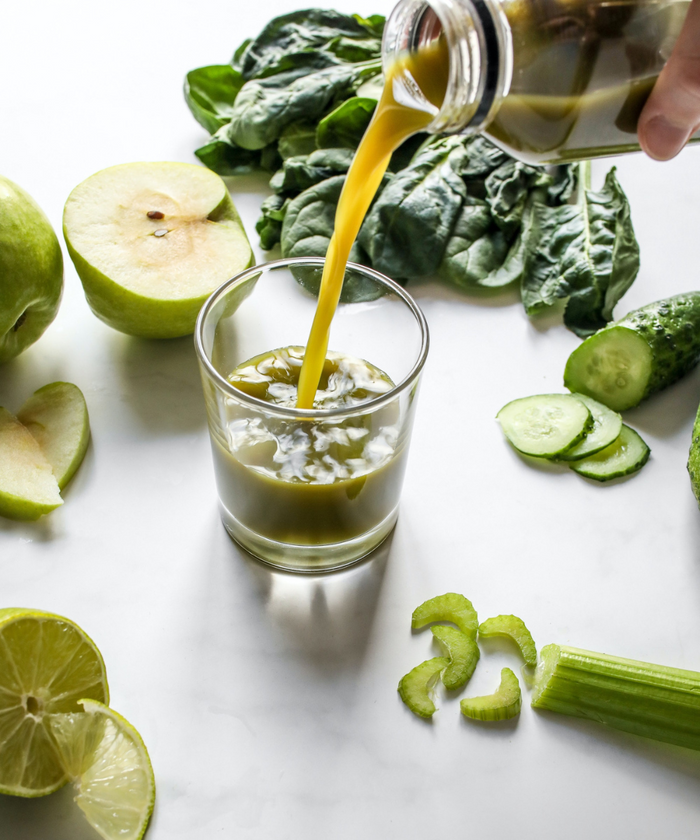Imagine starting your day with a glass of vibrant green liquid, packed with nutrients that promise to boost your health and vitality. This might sound too good to be true, but the daily celery juice movement has gained significant momentum, with many people swearing by its numerous health benefits.
But is it good to drink celery juice every day? Is it really the miracle solution it’s made out to be? In this blog post, we’ll dive deep into the world of celery juice, uncovering its potential advantages and drawbacks, debunking myths, and helping you make an informed decision on whether or not to hop on the celery juice train.
Key Takeaways
- The “Daily Celery Juice Movement” is gaining popularity, with potential benefits such as improved digestion and weight loss.
- Celery juice can provide hydration, regulate blood pressure levels and contain anti-inflammatory properties. It should be consumed as part of a balanced diet for optimal health.
- It is important to consider potential risks or side effects associated with daily celery juice consumption in order to make an informed decision before adding it to your diet.
The Daily Celery Juice Movement

It seems like everyone from health enthusiasts to celebrities is jumping on the celery juice bandwagon. The trend involves consuming 8-10 ounces of pure celery juice every morning on an empty stomach, claiming to provide a myriad of health benefits including:
- Improved digestion
- Clearer skin
- Lowered blood pressure
- Weight loss
To drink celery juice, simply prepare and consume it first thing in the morning before eating anything else.
The history of celery consumption goes back thousands of years, with ancient rulers and warriors like King Tutankhamun of Egypt and the horses of Troy’s gladiators in Homer’s Iliad benefiting from its nutritional value.
So, is there any truth to the hype surrounding this humble green vegetable?
The Rise of Celery Juice Popularity
The rise in popularity of celery juice can be attributed to several factors.
- The diet industry has long promoted celery as a low-calorie snack.
- Recent studies suggest that celery juice may help reduce blood pressure.
- The affordability and accessibility of celery juice make it an appealing option for those seeking to incorporate more vegetables into their diet.
The so-called “Medical Medium,” Anthony Williams, is credited with spawning the celery juice movement, claiming that it can heal chronic illnesses and bring about miraculous health transformations. Celebrities and social media influencers have also played a significant role in the propagation of the daily celery juice movement, endorsing its purported health benefits and sharing their personal experiences with the beverage.
As a result, celery juice has gone from being a niche health trend to a mainstream wellness phenomenon, with countless individuals seeking to experience its potential advantages firsthand.
Celebrity Endorsements and Social Media Influence
The power of celebrity endorsements cannot be underestimated when it comes to the spread of the celery juice movement.
From A-list actors to renowned athletes, many celebrities have vouched for celery juice as a beneficial health drink, contributing to its increased fame and widespread adoption.
These endorsements carry weight, as fans and followers often look to their favorite celebrities for health and wellness inspiration.
Social media platforms like Instagram, Twitter, and Facebook have also played a significant role in amplifying the message about the potential benefits of daily celery juice consumption.
Through captivating images, testimonials, and informative posts, social media has facilitated the dissemination of information about celery juice, helping to further cement its status as a popular health trend.
Advantages of Drinking Celery Juice Every Day

Considering the buzz around daily intake of celery juice, it’s quite intriguing to explore the real health benefits it could provide. Celery juice is indeed packed with essential nutrients like:
- Vitamin K, which contributes to blood clotting
- Vitamin C, which supports immune system health
- Potassium, which is important for muscle and nerve function
In addition to these nutrients, celery juice has been praised for its hydration and blood pressure management properties, as well as its anti-inflammatory effects. Yet, it’s vital to remember that despite celery juice potentially offering certain health perks, it shouldn’t be seen as a panacea.
A balanced diet and a healthy lifestyle are crucial for overall well-being, and celery juice should be viewed as just one component of a broader approach to health.
Hydration and Blood Pressure Management
A significant benefit attributed to celery juice is its contribution to hydration and blood pressure regulation.
Comprised of approximately 95% water, celery juice can contribute to your daily fluid intake, helping you stay hydrated. Maintaining hydration is a key factor in preserving good health, contributing to digestion, controlling body temperature, and supporting kidney function.
Additionally, celery juice is rich in potassium, a mineral that plays a crucial role in regulating blood pressure levels. By aiding in sodium level regulation in the body, potassium can help maintain blood pressure within a healthy scope. This makes celery juice a potentially beneficial addition to the diet of those looking to manage their blood pressure.
Anti-Inflammatory Properties
The anti-inflammatory properties of celery juice have also garnered much attention, with some suggesting that it could have a positive impact on chronic diseases.
Celery juice contains plant compounds like luteolin and pyrroloquinoline quinone (PQQ), which have been shown to possess anti-inflammatory and antioxidant effects. These properties might assist in reducing inflammation in the body, a significant element in the onset of conditions like rheumatoid arthritis, heart disease, and specific types of cancer.
While more research is needed to fully understand the potential impact of celery juice’s anti-inflammatory properties on chronic diseases, incorporating it into a balanced diet that includes other anti-inflammatory foods like fruits, vegetables, and whole grains could be beneficial for those looking to reduce inflammation and promote overall wellness.
Nutrient-Dense Superfood
Celery juice is often touted as a nutrient-dense superfood, providing a concentrated source of essential vitamins and minerals. As mentioned earlier, celery juice is rich in vitamin K, vitamin C, and potassium, all of which play important roles in various bodily functions.
In addition to these nutrients, celery juice also contains other B vitamins, antioxidants, and anti-inflammatory compounds, making it a valuable addition to a healthy diet.
Nevertheless, it’s crucial to keep in mind that despite celery juice offering various health benefits, it shouldn’t serve as the only source of nutrition.
A balanced diet that includes a variety of:
- fruits
- vegetables
- whole grains
- lean proteins
is crucial for maintaining good health and ensuring that the body receives all the nutrients it needs to function optimally.
Potential Risks and Side Effects of Daily Celery Juice Consumption

Despite the many health benefits associated with daily celery juice consumption, potential risks and side effects should also be considered. Some individuals may experience interactions with certain medications. You must also be aware of potential pesticide contamination, or elevated sodium content as a result of daily celery juice consumption.
It’s crucial to be aware of these potential issues and to consult with a healthcare professional if you have any concerns.
Being aware of the potential risks and side effects of daily celery juice consumption enables you to make a comprehensive decision about incorporating it into your diet.
Remember, it’s always best to approach health trends with a critical eye and to prioritize a balanced diet and lifestyle over quick fixes and miracle cures.
Interactions with Medications
One potential concern when drinking celery juice daily is the possibility of interactions with certain medications. For example, the vitamin K content in celery juice may interfere with blood thinners, potentially leading to serious health complications.
If you’re currently taking any medications, it’s important to consult with your healthcare professional before incorporating celery juice into your daily routine.
Awareness of potential medication interactions and professional consultation can ensure that the benefits of celery juice don’t compromise your health.
It’s always better to err on the side of caution when it comes to combining dietary changes with prescription medications.
Pesticide Contamination
Another potential risk associated with daily celery juice consumption is pesticide contamination. Non-organic celery is often grown using pesticides, which can leave residues on the vegetable and potentially lead to health issues such as headaches, nausea, and dizziness.
Celery is included on the Environmental Working Group’s Dirty Dozen list of produce with the highest pesticide residue, making it a cause for concern.
To mitigate pesticide exposure risk, opting for organic celery when feasible and thoroughly washing your celery before juicing is recommended.
By taking these precautions, you can enjoy the benefits of celery juice while minimizing the potential risks associated with pesticide contamination.
Sodium Content
The sodium content of celery juice is another potential concern for those considering daily consumption. One cup of celery juice contains approximately 215 mg of sodium, which could present a challenge for individuals on salt-restricted diets.
Consuming too much sodium can lead to high blood pressure and other health issues, so it’s important to be mindful of your overall sodium intake when incorporating celery juice into your diet.
If you follow a salt-restricted diet or have concerns about the sodium content in celery juice, consultation with your healthcare professional for personalized advice is recommended.
They can help you determine whether daily celery juice consumption is appropriate for your individual needs and offer guidance on how to balance your sodium intake.
Juicing vs. Eating Celery: Which is Better?

The debate between juicing celery and eating it whole is a common one, with proponents on both sides claiming their preferred method offers the most benefits.
We will review the pros and cons of juicing celery with consuming it whole, assisting you in deciding the approach that best suits your health objectives and lifestyle.
Ultimately, whether you choose to juice or eat your celery will depend on your individual preferences, nutritional needs, and health goals.
Evaluating the pros and cons of each method allows you to make a decision that aligns with your personal circumstances.
Fiber Content
One key difference between juicing and eating celery is the fiber content. When celery is juiced, the fiber is removed, resulting in a lower fiber content compared to whole celery.
Raw celery contains approximately 3 grams of fiber per cup, whereas juiced celery only has around 1 gram of fiber per cup.
Fiber is essential for digestive health and promoting a feeling of fullness, which can be beneficial for weight management.
Consuming whole celery enables you to leverage its full fiber content, which could potentially enhance gut health and satiety.
Nutrient Absorption
Another factor to consider when deciding between juicing and eating celery is nutrient absorption. While juicing celery may result in a more concentrated source of nutrients, the absence of fiber could lead to less efficient nutrient absorption compared to consuming whole celery.
In the end, the preference between juicing and consuming celery comes down to your personal health objectives and dietary inclinations.
If you’re looking to maximize nutrient absorption and maintain optimal gut health, you may wish to opt for whole celery. However, if you prefer a more convenient and concentrated source of nutrients, juicing could be the right choice for you.
Tips for Incorporating Celery Juice into Your Daily Routine

If you’ve decided to give celery juice a try, you might be wondering how to best incorporate it into your daily routine.
We will share useful advice on preparing celery juice at home, improving its taste, and effortlessly integrating it into your lifestyle.
Adhering to these tips and tailoring them to your personal liking can help you savor possible benefits of celery juice while making sure it remains a pleasurable and sustainable part of your diet.
Preparing Celery Juice at Home
Making fresh celery juice at home is simple and can be done with or without a juicer.
If you have a juicer, simply feed the celery stalks through the machine and collect the juice. If you don’t have a juicer, you can blend the celery in a high-speed blender until smooth, then strain the mixture through a nut milk bag or fine mesh strainer to separate the juice from the pulp.
When preparing celery juice, be sure to discard the bottom two inches of celery and wash the stalks thoroughly to remove any dirt or debris. This will ensure that your juice is as fresh and clean as possible, allowing you to fully enjoy its potential health benefits.
Enhancing the Flavor of Celery Juice
While some people enjoy the taste of pure celery juice, others may find it a bit too strong or earthy.
Luckily, there are several ways to enhance the flavor of celery juice while still reaping its health benefits. Try adding a splash of lemon juice, a pinch of ginger, or even a small amount of apple to your celery juice to create a more palatable and refreshing beverage.
By experimenting with different flavor combinations, you can find a celery juice recipe that suits your taste buds and makes it an enjoyable part of your daily routine.
Don’t be afraid to get creative and try new ingredients – the key is to find a flavor profile that you enjoy and can stick with in the long term.
To start, add celery juice to your favorite fruit or vegetable blend, and consider adding celery juice to other recipes for an extra boost of nutrients.
Debunking Myths and Misconceptions about Celery Juice

As with any popular health trend, there are bound to be myths and misconceptions surrounding celery juice and its purported health benefits.
In this section, we’ll address some of the most common false claims and misunderstandings about celery juice, helping you separate fact from fiction and make an informed decision about whether or not to include it in your diet.
By dispelling these myths and misconceptions, our aim is to offer a more measured and precise viewpoint on the possible benefits and constraints of daily celery juice intake.
Miracle Cure-All?
One of the most pervasive myths surrounding celery juice is the notion that it can cure chronic illnesses and provide miraculous health transformations. While it’s true that celery juice contains a range of beneficial nutrients and may offer certain health advantages, it should not be considered a miracle cure-all.
A balanced diet and a healthy lifestyle are crucial for overall well-being, and celery juice should be viewed as just one component of a broader approach to health.
It’s important to approach health trends like the celery juice movement with a critical eye and to prioritize a balanced diet and lifestyle over quick fixes and miracle cures. By doing so, you can ensure that you’re making informed decisions about your health and not falling prey to unfounded claims and exaggerations.
Detoxification Claims
Another common myth surrounding celery juice is the idea that it can detoxify the body. The truth is that the body is equipped with its own natural detoxification system, comprised of the liver, kidneys, intestines, and lungs, and does not require external assistance in the form of special beverages or cleanses.
While celery juice may provide various health benefits, it has not been proven to detoxify the body or cure chronic illnesses, as some proponents claim.
Summary
In conclusion, while daily celery juice consumption can offer several health benefits, it’s important to approach this trend with a balanced perspective. Celery juice should not be viewed as a miracle cure-all, but rather as one component of a healthy diet and lifestyle.
By being aware of the potential risks and side effects, debunking myths and misconceptions, and incorporating celery juice into your daily routine in a sensible and enjoyable way, you can make the most of its potential benefits and support your overall well-being.
Remember, the key to lasting health is not found in quick fixes or miracle cures, but in a balanced, sustainable approach to nutrition and lifestyle.
So, whether you choose to drink celery juice every day or simply enjoy it as an occasional refreshing beverage, always prioritize a well-rounded diet and healthy lifestyle for optimal wellness.
Frequently Asked Questions
Is it safe to drink celery juice everyday?
a: Celery juice can be a great and refreshing part of a balanced diet, providing essential nutrients to help our bodies function properly.
However, excessive consumption could lead to sensitivity to sunlight and orthorexia, so it’s best to enjoy celery juice in moderation as part of a healthy lifestyle. To get the most out of celery juice, drink 10 ounces per day.
How much fresh celery juice should I drink a day?
a: For optimal health benefits, it is recommended to drink 8-10 ounces of fresh celery juice each morning on an empty stomach.
What are the benefits of celery juice?
a: Celery juice offers numerous health benefits, including providing relief from inflammation, promoting cardiovascular health, preventing cancer and liver diseases, keeping you hydrated, improving sleep and brain function, and protecting your kidneys.
These benefits are backed by scientific research and have been proven to be effective in improving overall health and wellbeing. Celery juice is easy to make and can be enjoyed as part of a healthy diet. It is also a great way to get your daily dose of essential vitamins and minerals.
Does celery cleanse the liver?
a: Celery can help cleanse the liver due to its nutrient content which reduces fat build up and assists in the production of enzymes to flush out toxins.
Can celery juice cure chronic illnesses?
a: Though celery juice may offer certain health advantages, it should not be viewed as a cure-all for chronic illnesses.

